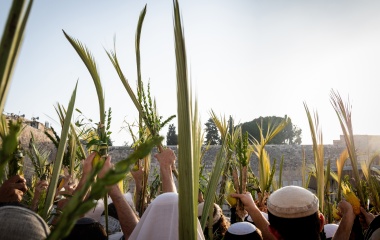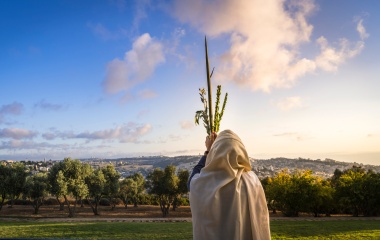
"On the first day, you must take for yourself a fruit of the citron tree, an opened palm frond, myrtle branches, and willows of the brook, and you shall rejoice before G-d for seven days" (Vayikra 23:40). While there is also a mitzvah to rejoice on Pesach and Shavuot, it is the holiday of Sukkot that is known as z’man simchateinu, the time of our rejoicing. The obligation to rejoice, while applicable, is not even mentioned regarding Pesach. Instead, it is mentioned twice regarding Sukkot. The Rambam teaches that while all holidays require joy, Sukkot carries simcha yeteira, extra joy. And it is the holiday of Sukkot that is referred to as chag, the “holiday” par excellence. What is it about Sukkot that brings extra joy?
The mitzvah of simcha, rejoicing on our holidays, consists of three components: eating and drinking, learning Torah, and sharing with others. Man, being a physical specimen, seeks pleasure. This is legitimate and even mandatory, provided it is done in the proper context. Man cannot be truly happy if his basic needs are not met. But physical pleasure itself can never bring true and complete happiness. Man's insatiable appetite means that whatever he has, he wants more. "Whoever has a hundred wants two hundred" (Kohelet Rabba 1:13) is the tragic fate of man, controlled by his physical needs.
Simcha requires Torah learning, spiritual nourishment, and intellectual development. The joy of seeking and searching for G-d, of sweat and tears, of exercising our brains is the second level of simcha. "The commandments of G-d gladden the heart" (Tehillim 19:9) , precluding a mourner from participating in this most joyous of activities, the study of Torah.
There is, however, an even greater level of simcha, that of helping and sharing with others. "You shall rejoice on your festival along with your son and daughter, your male and female servant, the Levi, stranger, orphan, and widow" (Devarim 16:14). The Torah's definition of simcha requires the participation of others, especially the less fortunate of society. Thus, there is a special obligation to give tzedakah at holiday time—feasting while others are in need is, in the words of the Rambam, the "joy of his stomach" as opposed to simcha shel mitzvah, religious joy (Laws of Yom Tov, 6:18).
The holiday of Pesach embodies the concept of physical simcha—we were freed from physical bondage and celebrate with the most elaborate meal of the year. Chametz and matzah are the central themes of the holiday. Shavuot, the day we received the Torah, is the celebration of our spiritual simcha. And Sukkot, when we thank G-d for our material blessings, is the holiday celebrating Jewish unity and sharing.
Our Sages have emphasized that the four species represent four different models of Jews, ranging from the most pious to the completely unaffiliated. Yet all must come together in order for any to be valid. It is only when we learn that all Jews are a unified whole that we will merit the blessing of uphrosh aleinu sukkat shelomecha, of being covered with the tabernacle of peace.
The highest level of simcha is to feel the presence of G-d. "And you shall rejoice before G-d" (Vayikra 23:40). The joy of feeling near to the Creator, while difficult to achieve, is an unparalleled one. Sukkot comes on the heels of the aseret yemei teshuva. Yom Kippur, the day of complete spirituality, of closeness to G-d, is the catalyst leading us to z’man simchateinu, to rejoicing with our fellow Jew and even non-Jew. Our joy is such that we bring 70 bullocks, representing the 70 nations that formed the basis of civilization.
The opening words of the RaMaH in his glosses to Orach Chaim, the first section of the Shulchan Arukh, the standard code of Jewish law are Shiviti Hashem l'negdi tamid, place G-d before you always (Tehillim 16:8). His last words are "tov lev misteh tamid, a good heart is always rejoicing". The path to misteh tamid, to constant joy, begins with Shiviti Hashem l'negdi tamid, being able to feel the constant presence of the Divine. It takes hard work, but it is well worth the effort.



